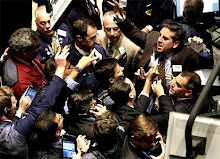The annual World Economic Forum opens this week under a cloud of economic worries, concern over China's growing influence in politics and business, and simmering anxieties over Europe's debt crisis.
Ahead of Wednesday's start, the meeting was greeted with news that Russian President Dmitry Medvedev had postponed his planned departure to Switzerland after what officials called a suicide bombing at Moscow's busiest airport killed 31 people and wounding about 130.
Organizers said Medvedev would still give the opening address on Wednesday evening. But they said his stay in Davos would be shortened.
Despite the lingering locksteps of fear, organizers of the five-day annual meeting — which will draw some 2,500 political and business leaders Jan. 26-30 — are optimistic that the debates, discussions and exchanges of ideas can provide a roadmap of sorts on the way forward after three years of global financial and economic turmoil.
"It's the first — I would call it post-crisis — meeting," Forum founder and executive chairman Klaus Schwab told The Associated Press Monday. "We have avoided the worst of the crisis, but we have not yet started to really build our future. Davos is the place to look at the new reality and see how we should construct our future."
The list of leaders headed to the Alpine town includes President Felipe Calderon of Mexico, British Prime Minister David Cameron, German Chancellor Angela Merkel and French President Nicolas Sarkozy, all part of the Group of 20 club of rich and developing countries.
Other G-20 leaders slated to attend are South African President Jacob Zuma, Indonesia President Susilo Bambang Yudhoyono and European Union Council President Herman Van Rompuy.
Skeptics note that while the gathering is a key stop for many executives and newly-minted national leaders to share a global and media-saturated stage, at times the meeting has not been prescient about coming financial eruptions.
Much has been made of the fact that last year's forum had little to say about the sovereign debt crisis that spread like wildfire across Europe several months later.
But Yngve Abrahamsen, an economist at Zurich's Swiss Economic Institute, said that may be asking too much even of the concentrated expertise that descends on the Swiss Alps each year.
"Peering into the economic future is always difficult," Abrahamsen said. "You might as well hire astrologists, because nobody knows what's going to happen in three months time."
"If anything, Davos is a little bit faster at picking up global themes," he said. "But a year ago nobody knew that the blowback from the bank bailouts would be so fast."
Abrahamsen said the one charge many participants — especially banking leaders — might face is that they were quick to cozy up to governments when they needed a bailout, but when countries faced imminent bankruptcy they turned around and ratcheted up the interest rates.
The European sovereign debt crisis has rocked financial markets since then, and led some to wonder if the euro could even break up.
Schwab said he doesn't think it will.
"I'm absolutely sure that the euro will not collapse because I think there is still a strong European solidarity in place," he told AP. "Europe, in this new world that is coming up, if it wants to become a key actor and stay a key actor it has to express itself in terms of its unity and it has to make sure that euro is also secured by a much greater common effort, working together in fiscal monetary and general economic policies."
Organizers are trying to answer their critics this year by taking time to discuss how to deal with unforeseen risk — the "unknown unknowns" as former U.S. Defense Secretary Donald Rumsfeld once put it.
The oil industry was hit by the reaction to the Gulf of Mexico disaster; governments have been struggling to contain the fallout from the WikiLeaks revelations; and anybody who said Tunisia would be the first Middle East country to see a popular revolution in years would have been laughed out of the room not two months ago.
A report compiled by the forum's in-house think tank highlights 37 global risks ranging from cyber warfare to public uprisings resulting from population growth and resource shortages. Sudden food price rises have already sparked alarm in Asia.
The surging cost of food in China pushed inflation there to 4.6 percent in December, and the ruling Communist Party is expected to respond by raising interest rates to tame price rises.
"Every uncertainty in the world has to do with Chinese politics," said Arturo Bries, a finance professor at the IMD business school in Lausanne. "I'm not expecting any surprises from the Western leaders, but we may have surprises coming from China."
Monday, January 24, 2011
Subscribe to:
Post Comments (Atom)


No comments:
Post a Comment